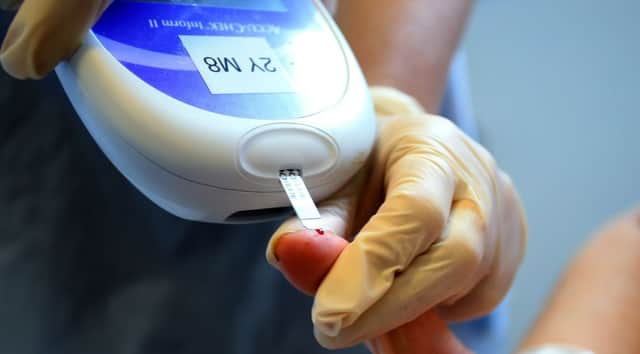More than a third of Scots unaware of complications from diabetes


The research, commissioned by Diabetes UK, found 38% of respondents did not realise those with the conditions are susceptible to the painful sores.
It comes as the charity launches its Putting Feet First campaign to raise awareness of the complications, including the loss of limbs.
Advertisement
Hide AdAdvertisement
Hide AdLinda McGlynn, regional engagement manager, said: “Diabetes-related amputations can devastate lives. But, with the right support, four out of five amputations can be preventable. That’s why it’s essential that people living with diabetes in Scotland know how to look after their feet, and that they check them daily.
“It’s also crucial that people know to seek urgent medical attention if they notice any problems with their feet, a matter of hours can make the difference between losing and keeping a limb.”
According to the Scottish Diabetes Survey 2016, carried out by YouGov, 59.1% of people with Type one diabetes and 73.2% of people with Type two diabetes have had their feet properly checked within the previous 15 months.
Foot problems, such as infections or ulcers, can deteriorate quickly and have devastating consequences for those with the conditions.
More than 2,000 people in Scotland are living with a diabetes-related major lower limb amputation, with many more having experienced losing another smaller body part such as a toe.
Up to 80 per cent of people with diabetes die within five years of amputation surgery, according to the charity.
Ms McGlynn added: “Attending an annual foot check is vital. These checks are vital in assessing foot health, recognising the potential for problems and reducing the risk of foot ulcers.”
The new campaign highlights how people can carry out their own feet inspections.
Advertisement
Hide AdAdvertisement
Hide AdThis can be done by removing any outer layers, checking their temperature, looking for changes in shape or colour, checking for calluses, as well as inspecting toenails and in between toes.
Diabetes is a life-long health condition which affects around 3.5 million people in the UK alone.
On top of that, experts estimate there are 549,000 people living with diabetes who do not know it yet.
It is a condition caused by high levels of glucose - or sugar - in the blood.
Glucose levels are so high because the body is unable to properly use it.